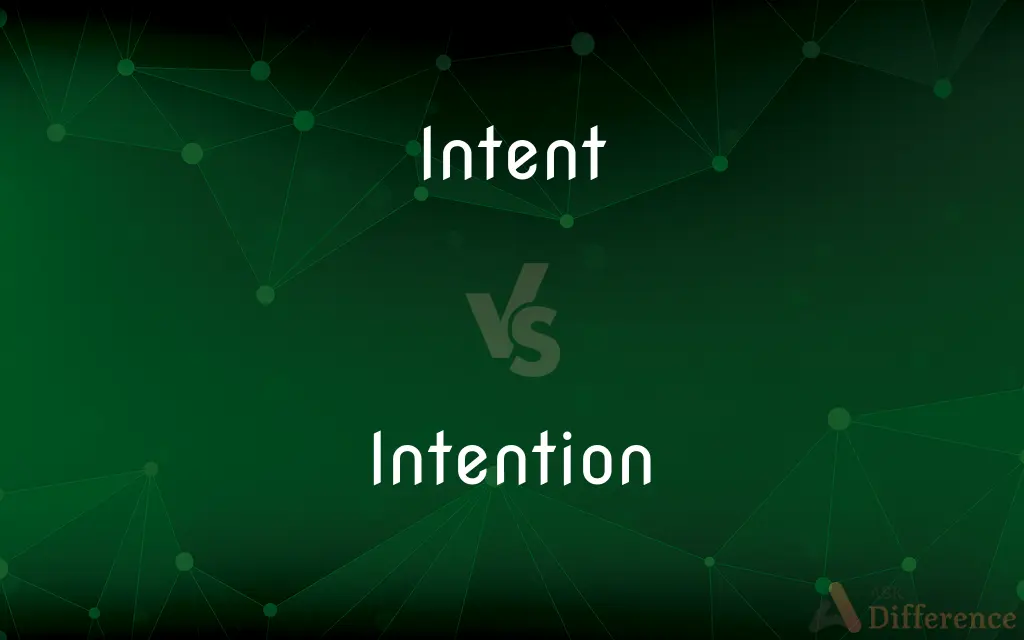Intent vs. Intention — What's the Difference?
By Tayyaba Rehman & Fiza Rafique — Updated on April 18, 2024
"Intent" typically refers to the purpose behind an action, while "intention" connotes a planned future action.

Difference Between Intent and Intention
Table of Contents
ADVERTISEMENT
Key Differences
"Intent" is often used to describe a focused determination or aim that influences an action, whereas "intention" implies a premeditated plan that one intends to carry out.
"Intent" can imply a deeper level of commitment or resolve, while "intention" might simply refer to the idea of doing something in the future.
In legal contexts, "intent" is crucial as it relates to the state of mind behind an action, on the other hand, "intention" is used more broadly in everyday language to indicate planned actions.
"Intent" is usually singular and focused, making it common in discussions about mindset and outcomes. Conversely, "intention" can be broader, involving multiple plans or ideas.
In everyday speech, "intent" is often perceived as more immediate or serious, while "intention" can be more casual or less certain.
ADVERTISEMENT
Comparison Chart
Definition
Purpose or aim behind an action.
A plan or desire for future action.
Usage in speech
More formal and serious.
Broader and often more casual.
Legal relevance
Indicates state of mind.
Less frequently used legally.
Number of possible meanings
Usually singular and focused.
Can have multiple plans or ideas.
Temporal focus
Immediate or ongoing mindset.
Future-oriented.
Compare with Definitions
Intent
Purpose or objective behind an action.
His intent was clear when he saved the last piece of cake for his sister.
Intention
A plan or aim for future action.
His intention is to graduate with honors.
Intent
Determination to act in a certain way.
She approached the problem with a clear intent.
Intention
Desire to act in a specific way.
She has good intentions for helping out at the event.
Intent
Legal: The state of mind directing one's actions.
The prosecution must prove intent to establish guilt.
Intention
The act of intending to do something.
His intention to apologize was evident.
Intent
Focus or concentration.
He listened with intent to understand the complex lecture.
Intention
A design or plan.
The bridge was built with the intention of easing traffic.
Intent
Implied or understood meaning.
The intent of his comment was lost in translation.
Intention
An anticipatory consideration or expectation.
They set up the fundraiser with the intention of raising $10,000.
Intent
Something that is intended; an aim or purpose.
Intention
Intention is a mental state that represents a commitment to carrying out an action or actions in the future. Intention involves mental activities such as planning and forethought.
Intent
(Law) The state of mind necessary for an act to constitute a crime.
Intention
A thing intended; an aim or plan
He announced his intention to stand for re-election
She was full of good intentions
Intent
Firmly fixed; concentrated
An intent gaze.
Intention
The healing process of a wound.
Intent
Having the attention applied; engrossed
The students, intent upon their books, did not hear me enter the room.
Intention
Conceptions formed by directing the mind towards an object.
Intent
Having the mind and will focused on a specific purpose
Was intent on leaving within the hour.
Are intent upon being recognized.
Intention
The action or fact of intending
Are computers capable of intention?.
Intent
Something that is intended.
Intention
An aim that guides action; an objective
My intention is to learn Russian.
Intent
(legal) The state of someone’s mind at the time of committing an offence.
Intention
Intentions Purpose with respect to marriage
She worried that his intentions were not honorable.
Intent
Firmly fixed or concentrated on something.
A mind intent on self-improvement
Intention
(Medicine) The process by which or the manner in which a wound heals.
Intent
Engrossed.
Intention
(Archaic) Import; meaning.
Intent
Unwavering from a course of action.
Intention
A course of action that a person intends to follow.
My intention was to marry a wealthy widow.
It’s easy to promise anything when you have no intention of fulfilling any of it.
Intent
Closely directed; strictly attentive; bent; - said of the mind, thoughts, etc.; as, a mind intent on self-improvement.
Intention
The goal or purpose.
The intention of this legislation is to boost the economy.
Intent
Having the mind closely directed to or bent on an object; sedulous; eager in pursuit of an object; - formerly with to, but now with on; as, intent on business or pleasure.
Be intent and solicitous to take up the meaning of the speaker.
Intention
(obsolete) Tension; straining, stretching.
Intent
The act of turning the mind toward an object; hence, a design; a purpose; intention; meaning; drift; aim.
Be thy intents wicked or charitable.
The principal intent of Scripture is to deliver the laws of duties supernatural.
Intention
A stretching or bending of the mind toward an object or a purpose (an intent); closeness of application; fixedness of attention; earnestness.
Intent
An anticipated outcome that is intended or that guides your planned actions;
His intent was to provide a new translation
Good intentions are not enough
It was created with the conscious aim of answering immediate needs
He made no secret of his designs
Intention
(obsolete) The object toward which the thoughts are directed; end; aim.
Intent
The intended meaning of a communication
Intention
(obsolete) Any mental apprehension of an object.
Intent
Directed with intense concentration;
A fixed stare
An intent gaze
Intention
(medicine) The process of the healing of a wound.
Intent
Wholly absorbed as in thought;
Deep in thought
That engrossed look or rapt delight
The book had her totally engrossed
Enwrapped in dreams
So intent on this fantastic...narrative that she hardly stirred
Rapt with wonder
Wrapped in thought
Intention
To intend.
Intention
A stretching or bending of the mind toward an object; closeness of application; fixedness of attention; earnestness.
Intention is when the mind, with great earnestness, and of choice, fixes its view on any idea.
Intention
A determination to act in a certain way or to do a certain thing; purpose; design; as, an intention to go to New York.
Hell is paved with good intentions.
Intention
The object toward which the thoughts are directed; end; aim.
In [chronical distempers], the principal intention is to restore the tone of the solid parts.
Intention
The state of being strained. See Intension.
Intention
Any mental apprehension of an object.
Intention
An anticipated outcome that is intended or that guides your planned actions;
His intent was to provide a new translation
Good intentions are not enough
It was created with the conscious aim of answering immediate needs
He made no secret of his designs
Intention
(usually plural) the goal with respect to a marriage proposal;
His intentions are entirely honorable
Intention
An act of intending; a volition that you intend to carry out;
My intention changed once I saw her
Common Curiosities
What is the main difference between intent and intention?
Intent refers to the purpose behind an action, often with a serious connotation, while intention is about plans or aims for future actions.
Can "intent" and "intention" be used interchangeably?
While they can be similar, "intent" is usually more serious and used in legal or formal contexts, whereas "intention" is broader and more future-oriented.
Why might someone choose to use "intent" over "intention" in speech?
"Intent" might be chosen for its connotations of seriousness and immediacy, while "intention" is often less formal.
What are some synonyms for "intent" and "intention"?
For "intent," synonyms include purpose, aim, or objective. For "intention," synonyms might include plan, design, or goal.
Can the misuse of "intent" and "intention" lead to misunderstandings?
Yes, using "intent" when one means "intention" can suggest a more immediate or serious purpose than intended, potentially leading to confusion or miscommunication.
How does the legal definition of "intent" differ from everyday use?
Legally, "intent" specifically relates to the mental state at the time of an action, crucial for establishing aspects of guilt, unlike the more general everyday usage.
Is "intent" typically used in specific industries or fields?
Yes, "intent" is commonly used in legal, psychological, and business contexts, where understanding someone's purpose or mental state is crucial.
How do "intent" and "intention" influence communication styles?
"Intent" often requires more direct and clear communication, whereas "intention" can be expressed in a more flexible and exploratory manner.
How does one clarify their intent or intention effectively?
Clarifying intent or intention can be achieved by being specific about purposes, expected outcomes, and the reasons behind actions, especially in formal or professional communications.
How do cultural differences impact the usage of "intent" and "intention"?
Cultural nuances might affect how directly or openly intentions are expressed, with "intent" possibly being used in more straightforward or individualistic cultures.
How can understanding the difference between "intent" and "intention" improve interpersonal relationships?
Recognizing whether a person is speaking about immediate determinations or future plans can lead to better empathy and alignment of expectations in relationships.
What implications does "intent" have in a professional setting?
In professional settings, stating one's intent clearly can communicate determination and focus, essential for leadership and management roles.
In what contexts might "intention" not suffice where "intent" is necessary?
In legal documents or situations requiring precision about someone's mental state, such as in establishing motive or culpability, "intent" is necessary, while "intention" might be too vague.
What impact do "intent" and "intention" have on goal setting and achievement?
Clear intent is crucial for precise goal setting and strong focus on outcomes, while clear intentions help in planning and preparing for future actions.
What are the consequences of not clearly defining "intent" or "intention" in business contracts?
Ambiguities in defining "intent" or "intention" in contracts can lead to disputes and legal challenges, emphasizing the importance of clear language and definitions in legal documents.
Share Your Discovery

Previous Comparison
Curb vs. Curve
Next Comparison
Rather vs. PreferAuthor Spotlight
Written by
Tayyaba RehmanTayyaba Rehman is a distinguished writer, currently serving as a primary contributor to askdifference.com. As a researcher in semantics and etymology, Tayyaba's passion for the complexity of languages and their distinctions has found a perfect home on the platform. Tayyaba delves into the intricacies of language, distinguishing between commonly confused words and phrases, thereby providing clarity for readers worldwide.
Co-written by
Fiza RafiqueFiza Rafique is a skilled content writer at AskDifference.com, where she meticulously refines and enhances written pieces. Drawing from her vast editorial expertise, Fiza ensures clarity, accuracy, and precision in every article. Passionate about language, she continually seeks to elevate the quality of content for readers worldwide.














































